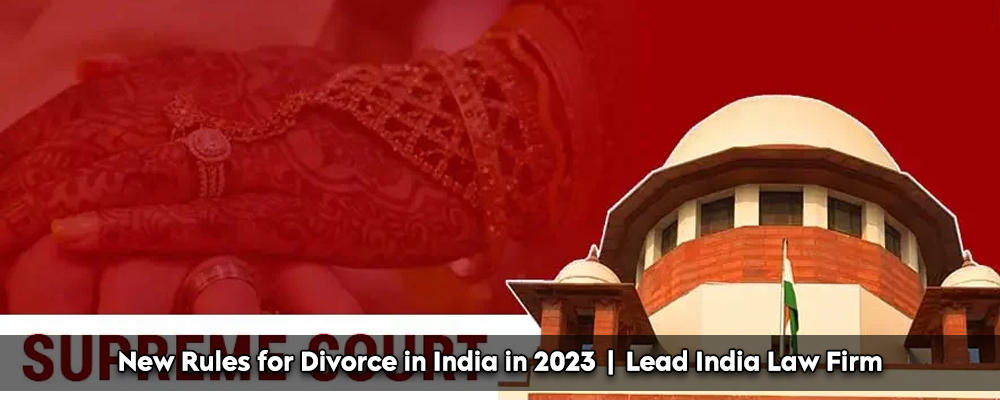If the parties believe they cannot continue the marriage, they will not hesitate to file for divorce. The courts develop laws to settle divorce disputes and offer fairness to both parties. It’s important to emphasize that these revisions are part of the 2023 update to the Hindu Marriage Act, which exclusively applies to Hindus. Other religious organizations have their own marital rules and may have distinct reasons for divorce.
New Rules
Waiving the Mandatory 6 Months Period for Rehabilitation
According to Section 13B (2), when spouses file for divorce with mutual consent, the court gives them a statutory six-month interval to contemplate any changes to their choice. The court grants this time to salvage the marriage. After six months, the couple might choose to reconcile or divorce. A six-month recovery time was required. However, under the new regulation, it is no longer required and is left to the discretion of the court. The court may determine, based on the facts and circumstances of the given case, whether a six-month rehabilitation period is necessary or if the couple should be permitted to divorce immediately. This was found in the Supreme Court judgment in the Akanksha versus Anupam Mathur case. The court was persuaded that the couple had made a conscious choice to divorce, and there was no purpose in asking the parties to wait another six months for divorce. The court decided to waive the six-month limit and ordered the marriage to be annulled.
Need A Legal Advice
The internet is not a lawyer and neither are you. Talk to a real lawyer about your legal issue

Irretrievable Breakdown of Marriage
When a couple decides that they can no longer live together as married partners, this is referred to as separation or the collapse of the marriage. The partners may or may not live under the same roof, but they are not married. In divorce law, there are no special regulations regarding this subject. The Supreme Court ruled in Sangamitra Ghose vs. Kajal Kumar Ghosh that the couple’s marriage was irretrievably destroyed and that there was no way to mend the relationship. As a result, the Supreme Court ruled that the couple can divorce based on the irreversible disintegration of their marriage.
Law of Maintenance Extended for Live-in Relationships
According to the Hindu Marriage Act of 1955, the court may impose the payment of maintenance. This is to assist women in maintaining the same quality of life following divorce. If the marriage is not legal under Hindu law, the wife may seek support under Section 125 of the Criminal Procedure Code. From the perspective of the law, a live-in partnership is considered a marriage. As a result, under the Code of Criminal Procedure, a woman who was in a live-in relationship can likewise seek maintenance from her live-in spouse. Furthermore, if the couples have been in a live-in relationship for a long period, there is no need to give stringent proof of marriage. According to the new divorce regulations in India 2022, the victim, i.e. the wife or live-in partner, can seek remedy under the Protection of Women from Domestic Violence Act, 2005, even if she is not entitled to a claim under the Criminal Procedure Code. The victim may seek more remedies under the Protection of Women from Domestic Violence Act than is provided under the Code of Criminal Procedure.
Adultery Is Not Punishable
According to the new guidelines, adultery might be deemed a reason for divorce in India, although it is not penalized. The court stated that penalizing the spouse and his or her lover with whom he or she committed adultery cannot be used to preserve the marriage. The couples can divorce based on adultery, but there is no punishment for adultery.
Triple Talaq is not a valid reason for divorce: According to Muslim law, simply pronouncing ‘Talaq’ three times can lead to divorce in India. This practice is unjust to Muslim women since it gives Muslim males the authority to end a marriage unilaterally. The arbitrary practice of triple talaq is a violation of women’s rights. According to the new divorce regulations in India for 2023, the ‘Triple Talaq’ has been ruled unconstitutional and has no legal significance.
Divorce under personal law cannot override the power of the civil court
The divorce may only be ordered by the Civil Court: https://districts.ecourts.gov.in/. If the Christian Church or any other personal law authorizes the divorce, it is null and void. In the case of Molly Joseph vs. George Sebastian, the Supreme Court ruled that the competent court may only grant dissolution of marriage. The order or decree of the Civil Court must have precedence over any order made by personal law or the Ecclesiastical Tribunal.
For divorce, you can contact a Law Firm like Lead India. Legal help, online tools, and free legal advice are all offered by Lead India. As soon as you have Lila, you can talk to a lawyer immediately away. Ask a legal question for advice.





 Talk to a Lawyer
Talk to a Lawyer